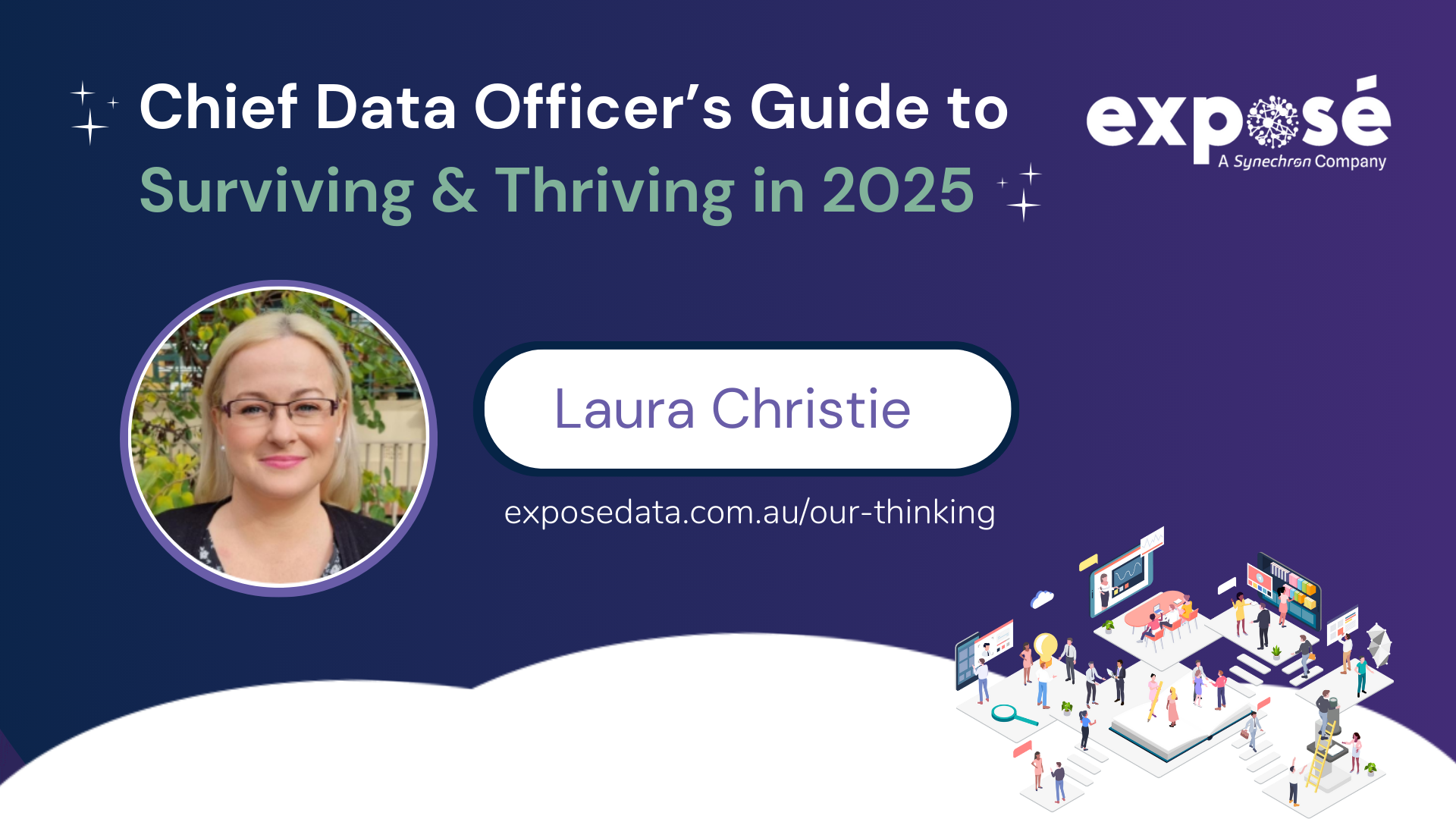
Chief Data Officer’s Guide to Surviving & Thriving in 2025
Author: Laura Christie
The Chief Data Officer (CDO) role has levelled up, becoming a key player in the organisational strategy game as businesses lean harder into being data-driven. With great data comes great responsibility (and, let’s face it, a growing to-do list).
The CDO is the mastermind behind a company’s data strategy, managing data effectively, keeping it secure, and leading efforts to turn raw information into actionable insights. It’s about squeezing every drop of value from data while side-stepping any risks lurking in the wings.
And just when you thought it couldn’t get any trickier, along came advanced analytics, artificial intelligence, generative AI (GenAI), and machine learning (ML). These tools are now the secret sauce for a winning CDO strategy, but they’ve also raised the bar. Expectations? Through the roof. But hey, no pressure.
In 2025, CDOs are tackling a landscape filled with challenges, triumphs, and the occasional curveball. While dashboards and algorithms are key players, let’s not forget the importance of people, strategy, and culture in driving transformative change.
Three dominant themes shaping the CDO role this year include:
- The ever-evolving job description (it changes faster than AI algorithms).
- Surfing the generative AI wave without wiping out.
- Building a data-engaged culture, because gut instinct isn’t a KPI (at least that is what you keep trying to tell people).
But let’s dive into what you can expect from 2025
1. Evolving Leadership in a Data-Driven World
Being a CDO in 2025 is similar to riding a rollercoaster where the speed keeps increasing, and no two days are alike. Once seen as the “data custodian,” today’s CDO is a business transformer, navigating uncertainty and driving innovation. Think of it as being handed a crystal ball that requires constant software updates.
Key Insights
- Shifting Responsibilities: CDOs are no longer just number crunchers. They align data with business strategy, manage teams, and champion cultural transformation. It’s data governance meets motivational speaking.
- Overcoming Challenges: From geopolitical risks to unexpected pandemics, CDOs must prepare for volatile, uncertain, complex, and ambiguous futures. No pressure, right?
- Resilience is Key: Agility, foresight, and a solid sense of humour form the trifecta for surviving and thriving in this role this year (and keeping your sanity; remember you are not alone in the battle for a data-driven culture).
Successful Leadership Strategies
- Break Down Silos: Data hoarders, beware, collaboration is non-negotiable.
- Collaborate Relentlessly: Align stakeholders to shared goals from the boardroom to the breakroom.
- Own the Narrative: As the storyteller of data, turn your insights into a bestseller.
2. From AI Tsunami to Augmented Organisation
AI has shifted from a luxury to a necessity, with generative AI dominating conversations. But deploying AI isn’t all smooth sailing. While Boards are hyped about its potential, CDOs are busy managing expectations and mitigating risks.
Big Challenges
- Unrealistic Expectations: Everyone wants AI to solve all problems (except world hunger, that’s next quarter).
- Talent Shortages: Good AI talent is harder to find than your car keys on a Monday morning.
- Data Woes: Poor data governance is like building on quicksand, nothing lasts. Some people listen and some people will never listen (you can only do so much)
Strategies for Success to Win Over the Current Unwinnable Stakeholder
- Laser Focus on Value: Only invest in use cases with measurable impacts. Test first with proof of concept and perfect from there before looking to scale. Prove the ROI using what you know best: the data.
- Automate Relentlessly: Use automation to fast-track success and save your sanity.
- Build a Strong Tech Stack: A solid tech stack attracts talent and ensures scalability. Think of it as the AI version of good coffee in the breakroom.
3. Fostering a Data-Engaged Organisation
Convincing people to embrace data sometimes feels like trying to get a cat to love water; it’s possible, but not without effort. Building a data-engaged culture is the secret to embedding data-driven decision-making across an organisation. Spoiler: it’s a marathon, not a sprint.
Winning Strategies
1. Align Data Initiatives with Strategic Goals: Speak the bean counters’ language and show them how data grows their beans.
2. Break Down Silos: Data hoarders, your days are numbered.
3. Invest in Data Literacy: Make fluency in data the workplace’s latest trend and champion data-driven KPIs linked to their annual review (making them use the data to prove their worth makes them realise how important data is and its quality). Then expect a line of people coming to you with ‘ways to improve’ the data and requests for ad-hoc reports, so to keep your team sane, be prepared to build (if it’s not in place) a self-serve reporting culture.
4. Data Governance at Scale
As organisations amass unprecedented amounts of data, effective governance becomes mission-critical. In 2025, scalable data governance will hinge on:
- Automation: Leveraging AI to classify, manage, and secure data.
- Collaboration: Involving cross-functional teams to align data governance with business goals.
- Regulatory Compliance: Keeping pace with evolving data privacy laws and new legislations, it’s likely conversations have already changed and are evolving by policymakers by the time you finish this sentence.
Additional Trends to Expect in 2025
5. CDOs as Transformers
CDOs are shifting gears from tech geniuses to organisational masterminds. Their secret? Bridging the gap between data capabilities and business outcomes like pros. You’ve got this; we know you do.
6. Generative AI Needs a Solid Ethical Foundation
Generative AI may be the year’s buzzword (again), but without strong governance and high-quality data, it’s a shiny tool without a clear purpose. Sure, it’s exciting and full of potential, but with great power comes even greater responsibility. This year, CDOs are taking the lead in ensuring that AI-driven decisions are not only innovative but also ethical, transparent, and free from bias.
It’s not just about ticking the moral and ethical boxes (although that’s crucial); it’s about protecting the organisation’s reputation and steering clear of legal pitfalls. CDOs build trust with customers and stakeholders by embedding ethical guidelines and proactively auditing algorithms while demonstrating that AI can be transformative and responsible. After all, AI that works for everyone is the real win.
Key Considerations:
- Ethical AI Guidelines: CDOs are rolling out robust frameworks to ensure AI development and data usage align with fairness and transparency principles.
- Algorithm Audits: Regular check-ups on algorithms ensure they’re not inadvertently baking in bias or serving up discriminatory outcomes.
- Building Trust: Ethical AI isn’t just good PR; it’s a trust-building exercise with customers, showing that data is being used responsibly and fairly.
- By championing these practices, CDOs make sure the organisation avoids becoming a headline for the wrong reasons while boosting customer confidence in their AI-powered offerings.
7. Culture Eats Data for Breakfast
Tech is great, but without a data-friendly culture, it’s like trying to win a marathon in flip-flops, possible but painful.
8. Prove Your Worth
ROI is your best argument for more buy-in. Visually tell the story simply so stakeholders can understand your important message (we hear you and get you, but), make sure that your audience doesn’t feel like they are deciphering a TED talk technology speech riddled with shop talk (although that is a Ted Talk we would love to watch, you need to keep things simply for others to get it, make it relatable to their job and the ROI/ it’s value to them).
9. The Future is AI-Driven
CDOs are the captains steering the AI ship; make sure you’ve got a clear map and guide people through it as you deliver, showing the value. Don’t forget to futureproof to protect against the constant flow of change coming your way this year.
10. Collaboration is Essential
Whether it’s cultural change or full-scale transformation, it doesn’t happen in silos. Bring the stakeholders along for the ride. Don’t forget to visualise the ROI and value every step of the way.
11. Navigating Emerging Technologies/Trends
Deciphering between the next buzzword and the next big thing that will drive maximum value and ROI. Who said data was boring? Said no CDO ever! Also, expect people to start coming to you more to talk about the decentralisation of data and data mesh strategies
12. Sustainability and Green Data Practices
With massive data centres with ever-increasing technology consuming vast amounts of energy, expect stakeholders to come to you requesting greener sustainability practices.
13. Continued Resilience in Data Operations: Cybersecurity threats are intensifying, making resilience a top priority. To safeguard data operations, CDOs should:
- Continue to Develop robust disaster recovery plans.
- Employ zero-trust security models.
- Conduct regular security audits and simulations.
- Resilience ensures that business operations continue uninterrupted, even in the face of threats.
14. Don’t forget to fasten your seatbelt for more change this year!
As AI transforms industries from utilities to healthcare, CDOs are stepping up as the ultimate orchestrators of change. Whether you’re a seasoned leader or new to the role, 2025 offers exciting challenges and opportunities. Remember, it’s not just about crunching numbers; it’s about creating value, driving culture, and steering organisations toward a brighter, data-driven future. And remember, you’ve totally got this.
Here’s to thriving (and surviving) in the ever-changing role of Chief Data Officer this year. And we are in your corner here to support you all the way. Reach out to our friendly team here to learn how we can be there front row and centre to support you in kicking your goals this year.
